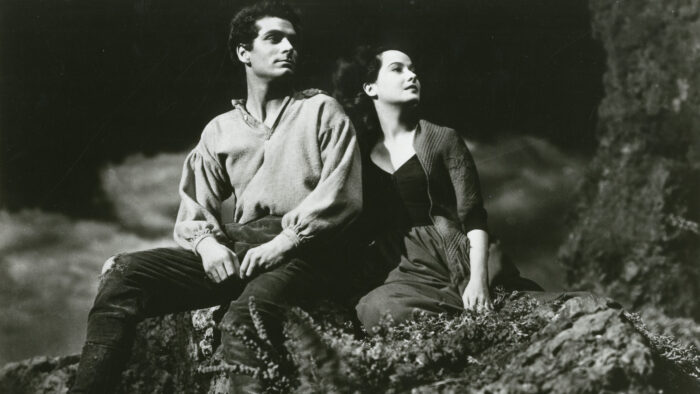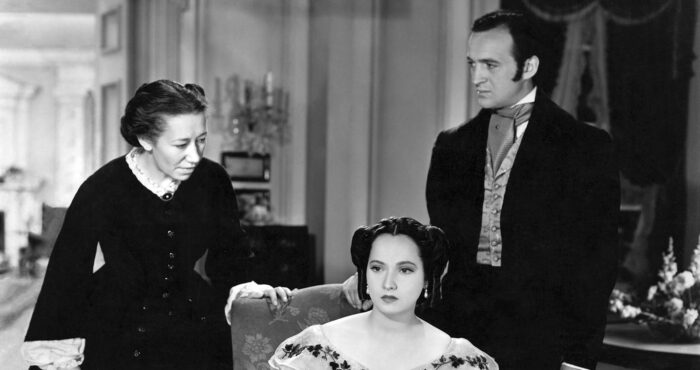
The 12th Academy Awards (1940)
Nominations: 8
Wins: 1
Welcome once again to Oscar season here at Mildly Pleased! This is the time of year when we spend a tasteful two weeks looking back at Oscar nominees of years past as we eagerly anticipate (and in some cases dread) what will bring home the gold on Hollywood’s Biggest Night.
This year, the approach I took was reviewing two movies that are stuffy period pieces and two that are decidedly not. The first of which is Wuthering Heights, a movie that I’ve been interested in after reading Emily Brontë’s novel last year. It’s a movie that seems to exist in that netherworld of being a classic, but not an unimpeachable classic, since it was on AFI’s original 100 Years…100 Movies list from 1998, but was bumped from the updated 2007 list. That feels fair for what this movie is, as it’s a well-made production from perhaps the studio system’s greatest year, but can’t help but pale in comparison to other sweeping romances of that era with a similar vibe.
Since I am one of those people who “read the book”, I’ll offer some thoughts about how the movie compares to its source material. That said, 1939’s Wuthering Heights is one of those cases where it’s easy to disassociate the two works because the movie only attempts to adapt a little over a third of the novel. This is most likely because the book takes place over multiple decades, with multiple main characters, and lots of different storylines bordering on dark and tragic. But instead, this 1939 adaptation is an unapologetically classic Hollywood production of the material, so it sticks to a more straightforward narrative while emphasizing the more romantic elements of the novel.
For all the omitting from the novel that this movie does, it still has the same framing device of having the story being told by a maid at the Wuthering Heights estate to a traveler named Mr. Lockwood passing through. When the traveler appears at the door of this estate, he meets a grizzled Heathcliff (Lawrence Olivier, playing the second most beloved Heathcliff in the Western canon) who begrudgingly decides to put him up for the night. During this first night, Mr. Lockwood swears he sees the image of a young woman named Cathy roaming the moors that the estate is on. Then the maid Nelly (Flora Robson) starts telling the story of Heathcliff and Cathy as we flashback to when Heathcliff was a young boy.
The young Heathcliff is defined by coming from a family of gypsies, and despite being adopted with open arms by Mr. Earnshaw after being found on the streets of Liverpool, he constantly struggles with being an outsider. He eventually befriends Mr. Earnshaw’s daughter Cathy, whom he desperately needs as an ally considering how cruel Mr. Earnshaw’s son Hindley is and that Heathcliff is without a mentor after Earnshaw dies. The movie then cuts to 10 years later, where Heathcliff and Cathy (now played by Merle Oberon) are in love, though Hindley has grown more insufferable as the master of the estate.
One night, Cathy and Heathcliff sneak away to peek in on a lavish ball held at the estate of the Lintons, a wealthy family living in the same rural area that the Earnshaws inhabit. Cathy injures herself after being attacked by some guard dogs and ends up spending several weeks living with the Lintons, where she quickly starts to fall for Edgar Linton (David Niven). Because there isn’t the class difference that there is between her and Heathcliff, she decides to marry Edgar, which then compels Heathcliff to buy Wuthering Heights and become a respectable landowner. While it seems as though Heathcliff and Cathy do have this undying love even after Cathy marries Edgar, it becomes too little too late, as Cathy comes down with a terminal illness shortly after Heathcliff marries one of Edgar’s sisters.
As I mentioned, this isn’t anywhere near where the book ends, as the story continues on as Cathy and Heathcliff’s children develop relationships of their own and Heathcliff slowly becomes a bitter old man in his cavernous empty home. Also, the movie smoothes a lot of the novel’s harder edges, as it’s very much about grudges and cruelty brought on by years of feuding between families who have nothing better to obsess over. But this is Hollywood, baby! And I honestly don’t mind that the film takes a lot of liberties with transforming this into a much more conventional romance, since it’s pretty much impossible to imagine MGM in 1939 producing a faithful adaptation of a novel that is far from a crowd-pleaser and doesn’t lend itself well to the limitations of the early sound era.
So it’s easiest to just take this movie as its own separate work of fiction, even if it wouldn’t be nearly as compelling if it didn’t contain one of the more compelling characters in English literature. Speaking of, it is pretty fun to watch Lawrence Olivier as Heathcliff, since I’ve always wanted to see more of this most heralded of actors, though I’ve never had enough of an affinity for The Bard to see Olivier’s Shakespeare movies. Here, he captures the smoldering intensity of Heathcliff quite well, though much like this adaptation as a whole, he’s a bit softer and a bit more of a romantic. Olivier supposedly clashed with William Wyler frequently, as the director would ask for endless takes with little overt direction, though Olivier would later say that this process taught him how to act for the camera as opposed to the stage.
As for William Wyler, he strikes me as being possibly the first auteur of Oscar bait. He’s second only to John Ford with 3 Best Director wins, and holds the record for most Best Director nominations with 12, despite being a filmmaker whom very few modern directors talk about being influenced by. That said, I’ve more or less liked all of his movies that I’ve seen, even if The Best Years of Our Lives is probably the only one that rises to the level of being something truly remarkable. But his films are always very competently made, even if they sometimes lack personality. Though the one thing Wuthering Heights really has working for it is the cinematography of Citizen Kane DP Gregg Toland, who provides a few Kane-esque shots here, utilizing deep focus photography and the occasional dolly shot that evokes a certain kind of voyeurism.
Toland’s cinematography ended up being the only aspect of Wuthering Heights that was awarded with an Oscar, which is not all that surprising, despite the film being a very solid melodrama. This is not only because Wuthering Heights was competing against other notable classics that year, like Mr. Smith Goes To Washington, Ninotchka, Stagecoach, and The Wizard of Oz, but it was also going up against another lavish literary adaptation in Gone with the Wind. Even if you didn’t know that Wuthering Heights came out the same year as Gone with the Wind, you’d probably still be reminded of it. But because that film goes even harder on its sweeping qualities, leaning into epic territory, it’s hard not for Wuthering Heights to pale in comparison. Still, it’s more than worth checking out for both fans of the book and those looking for a more romantic, condensed version of this story.


